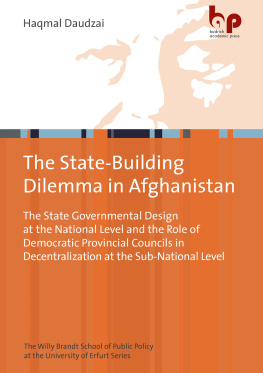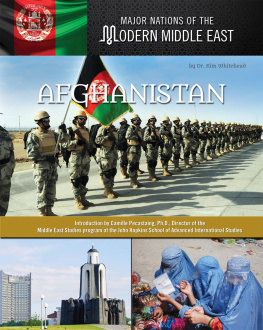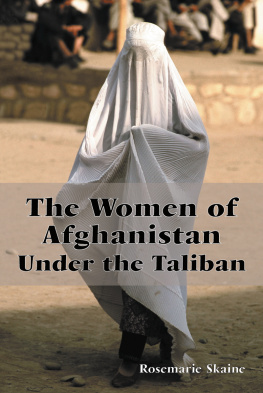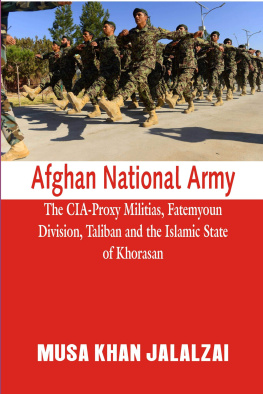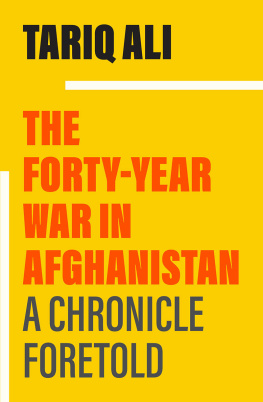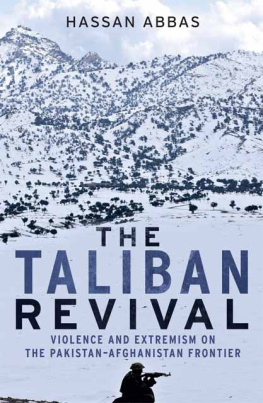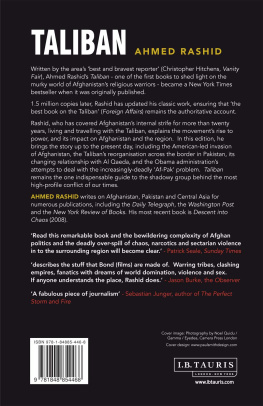Schriften der Willy Brandt School of Public Policy an der Universitt Erfurt
herausgegeben von Frank Ettrich und Dietmar Herz
The Willy Brandt School of Public Policy at the University of Erfurt Series
Edited by Frank Ettrich und Dietmar Herz
Haqmal Daudzai
The State-Building
Dilemma in Afghanistan
The State Governmental Design at the
National Level and the Role of Democratic
Provincial Councils in Decentralization at
the Sub-National Level
Budrich Academic Press
Opladen Berlin Toronto 2021
All rights reserved. No part of this publication may be reproduced, stored in or introduced into a retrieval system, or transmitted, in any form, or by any means (electronic, mechanical, photocopying, recording or otherwise) without the prior written permission of Barbara Budrich Publishers. Any person who does any unauthorized act in relation to this publication may be liable to criminal prosecution and civil claims for damages.
You must not circulate this book in any other binding or cover and you must impose this same condition on any acquirer.
A CIP catalogue record for this book is available from Die Deutsche Bibliothek (The German Library)
2021 by Budrich Academic Press GmbH, Opladen, Berlin & Toronto www.budrich.eu
ISBN 978-3-96665-030-4
eISBN 978-3-96665-974-1 (PDF)
eISBN 978-3-96665-950-5 (ePub)
DOI 10.3224/96665030
Das Werk einschlielich aller seiner Teile ist urheberrechtlich geschtzt. Jede Verwertung auerhalb der engen Grenzen des Urheberrechtsgesetzes ist ohne Zustimmung des Verlages unzulssig und strafbar. Das gilt insbesondere fr Vervielfltigungen, bersetzungen, Mikroverfilmungen und die Einspeicherung und Verarbeitung in elektronischen Systemen.
Die Deutsche Bibliothek CIP-Einheitsaufnahme
Ein Titeldatensatz fr die Publikation ist bei Der Deutschen Bibliothek erhltlich.
Budrich Academic Press
Stauffenbergstr. 7. D-51379 Leverkusen Opladen, Germany www.budrich-academic-press.de
86 Delma Drive. Toronto, ON M8W 4P6 Canada
Jacket illustration by Bettina Lehfeldt, Kleinmachnow, Germany
www.lehfeldtgraphic.de
Picture Credits: Peter Glotz Universitt Erfurt
Technical editing by Angelika Schulz, Zlpich, Germany
Printed in Europe on acid-free paper by docupoint GmbH, Barleben, Germany
E-Book-conversion: CPI books GmbH, Leck, Germany
[5] Acknowledgments
This Ph.D. dissertation owes a lot to the contributions of my beloved family, instructors, and friends. Foremost, I would like to conduct my sincere appreciation to my academic supervisors, Prof. Dr. Frank Ettrich, late Prof. Dr. Dietmar Herz and Dr. habil. Christian Wagner for their tireless academic guidance and moral support throughout this research project.
Taking the extremely hazardous situations in Afghanistan into consideration, I owe extensive gratitude to all my dear family members and friends who made the field research of this dissertation possible. My special appreciations go to my dear uncle, Eng. Hassan Nawab in the Herat province, and dear friends: Mirwais Arab in Bamyan, Nazar Hamdard in Balkh, Mustafa Manavi in Kandahar, Hewad Khogiani and Jahangir Khan Khogiani in Nangrahar and Eng. Hameed Muneeb Ibramkhil in Kabul, for accompanying me and facilitating accommodations and contacts during the field research.
I would also like to thank my sister-in-law, Parwana Khogiani, and dear friend Muneer Ahmad Daudzai for investing their time and energy in transcribing parts of the recorded interviews in Pashtu and Dari. I am also grateful to Abdul Hameed Sahak, a dear friend and at-the-time director of the Independent Commission for Overseeing and Implementation of the Constitution (ICOIC), for his constant encouragement and efforts in providing access to necessary documents and laws in Afghanistan for this research.
I would also like to thank Dr. Patricia Omidian and Nina Joy Lowrance, who have always been a sincere source of support, for putting me in contact with Ms. Anna Willman, a great scholar, editor, and author of several books. I owe immense appreciation to Ms. Anna Willman for her contribution to the editing process and her critical feedback and insightful comments on the contents of this dissertation.
This research project also owes a special thanks to the Konrad Adenauer Stiftung/Foundation (KAS) for providing generous financial stipends and academic seminars during the last four years. Last but not the least, I am obliged to my dear parents and family for their unconditional love, patience, and prayers throughout this research project. Indeed, without their support and encouragement, this Ph.D. dissertation would not have come into being.
Table of Content
[11] List of Acronyms
| Afghanistan Institute for Strategic Studies |
| Afghanistan Research Evaluation Unit |
| Community Development Council |
| Chief Executive Officer |
| Central Intelligence Agency |
| Constitutional Loya Jirga |
| District Council |
| Disarmament Demobilization and Reintegration |
| Independent Directorate of Local Governance |
| International Security Assistant Force |
| Inter-services Intelligence |
| Member of Parliament |
| North Atlantic Treaty Organization |
| National Unity Government |
| Organization for Economic Cooperation and Development |
| Provincial Council |
| Provincial Development Council |
| Single Non-transferable Vote |
| United of Soviet Socialist Republic |
| United Nation |
| United States |
| Village Council |
[13] Glossary
| Islamic Jurisprudence |
| Traditional community leader |
| Holy War |
| Consultative Council |
| Islamic-Community |
| The Upper House of the Afghan Parliament |
| Warriors or Freedom Fighters |
| The Pashtun ethnic code of conduct |
| The Islamic Law |
| Mayor |
| The National Assembly of Afghanistan |
| Provincial Governor |
| The Lower House of the Afghan Parliament |
| District Governor |
[15] PART ONE:
INTRODUCTION, CONCEPTS AND THEORIES
[17] Chapter 1: Introduction
The terrorist attack on September 11th was a human tragedy for the people of the United States, whereas for the people of Afghanistan, the United States subsequent military intervention that led to the toppling of the Taliban Emirate created a window of opportunity for lasting peace, democratization, and economic development. In November 2001, while the U.S. was still conducting its military operations (Operation Enduring Freedom) in the Afghan soil, the U.N. Security Council issued resolution 1378, convening an international conference in Bonn Germany aimed at forming a new government between the warring factions in Afghanistan (United Nations Security Council, 2001, p. 2).
The Bonn agreement (December 5, 2001) also known as the Bonn Accord produced a series of sequencing state-building steps including a six-month interim government, the emergency Loya Jirga (grand council) for the formation of a two-year transitional government, and the constitutional Loya Jirga for establishing a new Afghan constitution for a permanent government (Rubin, 2004).

